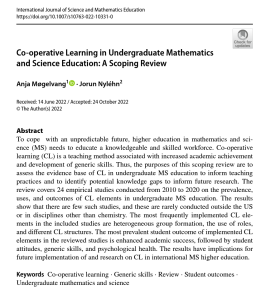Co-operative Learning in Undergraduate Mathematics and Science Education: A Scoping Review
Abstra ct
ct
To cope with an unpredictable future, higher education in mathematics and science (MS) needs to educate a knowledgeable and skilled workforce. Co-operative learning (CL) is a teaching method associated with increased academic achievement and development of generic skills. Thus, the purposes of this scoping review are to assess the evidence base of CL in undergraduate MS education to inform teaching practices and to identify potential knowledge gaps to inform future research. The review covers 24 empirical studies conducted from 2010 to 2020 on the prevalence, uses, and outcomes of CL elements in undergraduate MS education. The results show that there are few such studies, and these are rarely conducted outside the US or in disciplines other than chemistry. The most frequently implemented CL elements in the included studies are heterogeneous group formation, the use of roles, and different CL structures. The most prevalent student outcome of implemented CL elements in the reviewed studies is enhanced academic success, followed by student attitudes, generic skills, and psychological health. The results have implications for future implementation of and research on CL in international MS higher education.

